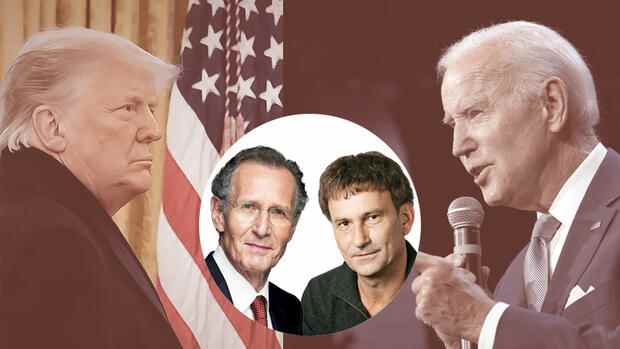If Joe Biden’s party fails to defend the Democratic majority in both houses, it would be a painful defeat for the president. Such failures are, of course, the rule rather than the exception. Since 1945, the incumbent’s party has lost an average of 29 House seats in midterm elections. In that case, Biden’s nine-seat Democratic majority would be gone.
In the past, the presidential party’s losses have been particularly high during periods of inflation. The inflation rate is currently at a good eight percent, the highest since the 1970s. The pollsters at least expect a change of power in the House of Representatives. Biden would then have to reckon with an intensified blockade policy by the Republicans – but he would not be a “lame duck”. Because he could also govern effectively by decree in the future. Donald Trump, for example, used the instrument of the “Executive Order” to terminate the Trans-Pacific Partnership free trade agreement right at the beginning of his presidency.
Biden’s defeat would be Trump’s victory
Still, defeating Biden’s Democrats would be a victory for Donald Trump. He still has the former Grand Old Party under control and was able to decisively influence the election of the Republican candidates. Successful midterms would give Trump additional motivation to run for another presidency.
Top jobs of the day
Find the best jobs now and
be notified by email.
However, should he no longer be presidential from his party’s point of view after a possible conviction for violations of the anti-espionage law, for example, the way would be free for Trump’s brother in spirit: Ron DeSantis, governor of Texas. With him, US right-wing populism has a young, “charismatic” protagonist in the race for the White House.
Global Challenges – idea and regular authors
The midterms on November 8 differ in one fundamental respect from all other midterm elections. Because since the storming of the Capitol in January 2021, it has been clear that “Trumpism” does not recognize the basic principles of democracy, which applies above all to the peaceful transfer of power. From the point of view of former Republican President George W. Bush, the movement embodies nothing more than the “malicious forces” of domestic “extremism”.
If Trumpism gains additional momentum through a win at the Midterms, it will certainly fuel fear and panic for two years, demanding law and order that strengthens the ultra-religious right – and further polarizing an already divided American society. The mood already widespread among Republicans that in 2024 they will not let victory in the presidential elections be “stolen” again threatens to become the mantra of the anti-democracy movement.
Both camps see Putin as a pariah
Should Biden’s Democrats still benefit from an economic recovery and declining inflation rates, there could be a close election result in two years. Then the Supreme Court would be called again. Even the last time Trump tried to manipulate his election defeat into a victory by using manipulation, the bulwark of the Supreme Court was not as solid as it seemed.
Judge Clarence Thomas, for example, had the Trump camp informed that Biden’s election victory should be further challenged. Today, the Supreme Court is firmly in the hands of judges like Thomas. The conservative camp dominates the liberal with six votes to three.
But no matter how much the outcome of the midterms may shake the statics of US democracy, the domestic antagonists will continue to pull together in foreign policy. With regard to China, the number one geopolitical rival, Democrats and Republicans agree: Beijing’s influence must be curbed, economically and politically. One can only hope that the territorial conflicts between Washington and Beijing, especially over the question of Taiwan, will not escalate militarily.
There are no signs of any fundamental differences between the Democrats and Republicans when it comes to Russia policy, even if the latter reject “blank checks” in support of Ukraine. Since Vladimir Putin’s attack on the neighboring country, Trump’s policy of appeasement towards Moscow has finally been a thing of the past.
Both camps see Putin as the pariah of world politics. This is all the easier as Russia has no chance of using its fossil-based business model to become the geo-economic competitor of the USA.
The authors:
Bert Ruerup is Chief Economist at Handelsblatt and President of the Handelsblatt Research Institute. Michael Brackmann is a journalist and oversees the Global Challenges series.
More: What Trump’s return would mean
